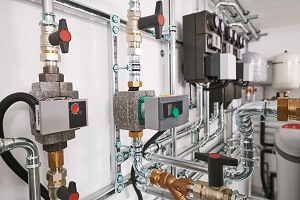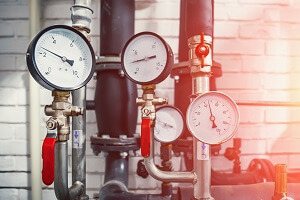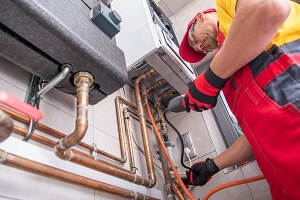 As a building owner or manager, you may encounter a variety of different heating systems on your property. Large buildings have different types of heating systems compared to what you might see in an individual home. Hydronic heating systems, which use water as the medium to transfer heat, are the most common systems you will see in buildings.
As a building owner or manager, you may encounter a variety of different heating systems on your property. Large buildings have different types of heating systems compared to what you might see in an individual home. Hydronic heating systems, which use water as the medium to transfer heat, are the most common systems you will see in buildings.
These are the most efficient heating systems for buildings, because they transfer heat using a fluid that can be easily controlled and regulated. This makes it easy to maintain a consistent temperature throughout the building.
Hot water heating systems and steam heating systems are both types of hydronic heating, which means they use water as the medium to transfer heat.
What Is a Hot Water Heating System?
A hot water heating system recirculates heated water through a system of pipes to radiators or air handler units, which then release the heat to the surrounding air. The water is usually heated by a boiler, which burns a fuel such as natural gas or oil to generate heat. The heated water is then circulated through the system using a pump.
How Does a Hot Water System Heat a Building?
Once your system is full of hot water and your coils are filled, an air handler unit with a fan blows over your coil that has been heated with that water. Thus, all of the heat that is radiating from the water through the coil is transferred into the air. In order to stay hot enough, the system must maintain supply temperatures between 140 and 190 degrees Fahrenheit.
What Is a Steam Heating System?
A steam heating system, on the other hand, uses steam to transfer heat. The steam is generated in a boiler, and is then distributed through the piping of the building. Contrary to the recirculating loop, the steam gives up its heat as it cools and condenses back into water, which is then returned to the boiler to be reheated.
How Does a Steam Heating System Work?
Steam travels to coils throughout the building and through the heat exchange equipment (radiators or air handler units) and heat is transferred into the building. To do so successfully, the system must maintain steam pressure between 15 and 75 PSI. Water returns to the boiler system in the form of condensate so it can be reused.
 Steam creates pressure, and the system maintains this pressure between 15 and 75 PSI (pounds per square inch). The hot steam used for heating returns to the boiler system after it has condensed back into droplets, so it can be reused.
Steam creates pressure, and the system maintains this pressure between 15 and 75 PSI (pounds per square inch). The hot steam used for heating returns to the boiler system after it has condensed back into droplets, so it can be reused.
Because of this consistent steam-to-water reclamation cycle, water treatment is more sophisticated, and water loss is common—often between 1% and 10%.
Contact The Water Treatment Pros
To learn more about Tower Water's services reach out today!
Key Differences Between a Hot Water and a Steam Heating System?
Both hot water and steam heating systems have their own advantages. However, in order to make the best choice for your building, you’ll need to understand some of their most significant differences.
Heating Method
Hot water heating recirculates water through a loop. It needs a boiler or heat exchanger in order to bring the water up to temperature for heating purposes. Conversely, in a steam system, the water is evaporated through a boiler to produce heat. While it does return in the form of condensation, the steam itself does not recirculate throughout the system.
Energy Efficiency
In general, hot water heating is more consistent. Because steam is a gas, it will follow the path of least resistance. You might have spots in your building that are cooler because it’s more difficult for steam to get there. Hot water, on the other hand, can be reliably directed through hard and fast piping channels to exactly where you need it to go. This means less energy spent to bring those areas up to temperature.
On the other hand, once a steam boiler has heated up the water, it uses very little energy to transfer the heat. Steam is very efficient for heating, so it can be more efficient for large buildings or areas where the temperature is extremely cold.
Maintenance Methods
Both hot water and steam heating systems require regular maintenance, but steam systems may require more frequent attention due to the higher pressures and temperatures they operate at. Water treatment for both hot loops and steam systems are also a critical part of maintenance.
Steam boilers specifically are more prone to scaling and corrosion which can reduce the efficiency and life of the system. Overall, more monitoring is needed for a steam system vs a hot water loop though both need to be protected against corrosion. This includes monitoring temperature, pressure, and water levels.
Which System Works Best?
 Hot water heating systems are efficient and consistent, though they may not provide a solution for your entire building. Steam heating systems are powerful even in the bitter cold, but they use a lot of energy to initially turn water into steam.
Hot water heating systems are efficient and consistent, though they may not provide a solution for your entire building. Steam heating systems are powerful even in the bitter cold, but they use a lot of energy to initially turn water into steam.
Maintenance for a steam system might be a bit more work, but can certainly provide an efficient and powerful solution to heating your entire building. In the end, most building managers and engineers will focus on efficiency and cost to determine which system they think works best.
If you’re running a medium sized building with a few closed loops it may be more cost effective vs a much larger building that needs steam because it requires a more effective and powerful heating solution.
Ultimately, the best heating system for a particular building will depend on the specific cost, efficiency, and maintenance circumstances of that building. For any help regarding maintenance or water treatment for your closed hot water loop or steam heating systems, reach out to the pros at Tower Water at (212) 518-6475 for an evaluation.
